Peace in our land: Toward a world without violence
American Baptist Home Mission Societies’ associate executive director of Communications, Susan L. Gottshall, is attending and providing regular updates from the 2019 Global Baptist Peace Conference in Cali, Colombia, July 15-20, where attendees represent approximately 30 countries and six continents.
July 20, 2019
The conference ends, the work begins anew
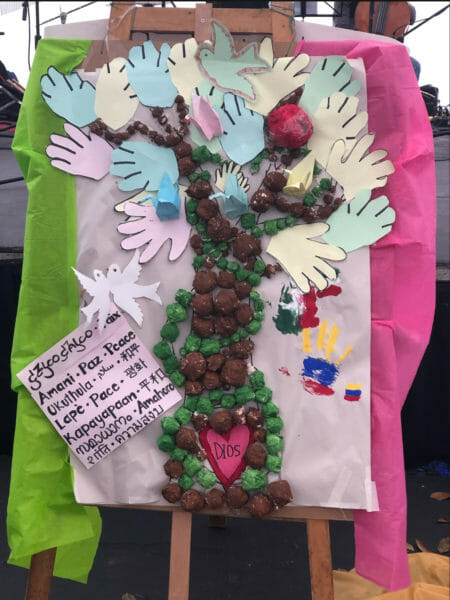 In the Philippines, the war on drugs has become a war on poverty, said Lizette Tapia at Friday’s peace conference plenary—with her country’s children in the crosshairs.
In the Philippines, the war on drugs has become a war on poverty, said Lizette Tapia at Friday’s peace conference plenary—with her country’s children in the crosshairs.
The violence has left behind increased numbers of orphans who have ended up on the streets, the pastor and theologian said; seven years ago, these rootless children totaled more than 5 million. The story of their lives horrifies in ways even a horror movie cannot.
At age 5, because of their size, these street children are used by crime syndicates to gain illegal entry to properties. At age 8, they’re taught to steal cars and, at age 12, they become drug couriers. By the time they reach 16, they will have killed someone; at age 18, they’re killed by the syndicate because they know too much.
It was yet another heart-wrenching story that made me marvel at the resiliency of these peace-makers. How do they, despite seeing unimaginable pain and suffering, keep putting one foot in front of the other to continue fighting for justice for the vulnerable and voiceless?
Pastoral theologian and professor Francesca Nuzzolese, who is also a psychotherapist, said, in response to Tapia, “I work on the ground with the pathology of human brokenness. There is something in the way we are made that gets us stuck in the place of violence. Is it within the human potential to build the kingdom of God on Earth? If so, why are we not doing it?”
Nuzzolese answered her own question: “Yes, we can do it. It is within our God-given potential because we can make choices, we have free will and we have agency.”
At the closing worship, Paul Hayes, a conference organizer and pastor, reminded those gathered, “We come together [this morning] not as a culmination of what has been done [this week] but as a commencement of things yet to be done.”
And so those who attended the Global Baptist Peace Conference, left Cali, Colombia—with renewed passion and fervor—blown by the breath of God like a wind blowing seeds across fields on a spring day.
They prove the resilience of humankind and its potential to build a world without violence.
No doubt they take with them the words of Maritze Trigos Torres, who shared her story of the Trujillo massacre earlier in the week: “Endure. Persist. Never give up.”
May it be so.
July 19, 2019
Respect, relationship and reconciliation: Sowing seeds of peace
On the taxi ride to the conference Thursday morning, the silence felt heavy. The driver spoke only Spanish, and I speak only English. Ordinarily, I would have talked to him about the weather or his family, but that was a barrier I couldn’t cross. What did I miss learning about him, I wondered, because I don’t know his language.
He was tall, with jet-black hair and a broad, authentic smile that filled a face deeply lined with kindness. His grip, when he helped me from the SUV, was firm and strong. His hand told me he didn’t want me to fall. I was thankful. I felt a thread of common humanity through the mutual respect we’d found for each other. In a matter of minutes, I had come to trust him.
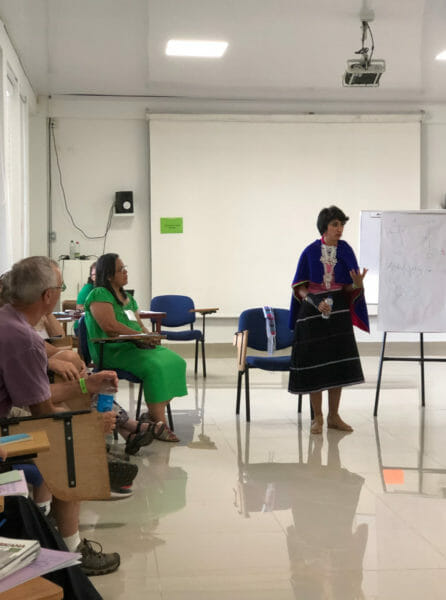 It was a fitting start to the day, which featured a plenary presentation by Manal El Tayar from Lebanon, who works on Christian/Muslim interfaith reconciliation with young people. Sometimes it’s language that keeps us apart; other times, it’s religion.
It was a fitting start to the day, which featured a plenary presentation by Manal El Tayar from Lebanon, who works on Christian/Muslim interfaith reconciliation with young people. Sometimes it’s language that keeps us apart; other times, it’s religion.
El Tayar received a standing ovation for her description of the successful peace-building initiative she developed in Lebanon—based on a curriculum that led youth from dialogue to taking action to love and do justice. Groups of six Christian and six Muslim youth, ages 14-16, met weekly for close to two months to share a meal and conversation, grounded in 11 guidelines, on topics such as “faith and identity” and “faith and conflict.”
At the close of the curriculum, the group planned an implementation project together. One group tackled environmental protection by identifying the threat of plastic, purchasing reusable, fabric bags, and taking them to Christian and Muslim stories in different parts of the city, asking the stores’ permission to give them away.
As much as putting faith into action, the dialogue groups sought to create friendships among the young people and build bridges to understanding and respect, seeds of peace-making.
Educator and counselor Mayra Picos Lee, in response to El Tayar, shared her experience from a sabbatical year researching migrant and immigrant families across the globe. “People have the same dreams, struggles and fears,” she said. “Our stories are more the same than they are different. Love is always bigger than fear and the only way to make a difference. We are here this morning because we believe we can make a difference. We are the difference.”
July 18, 2019
Peace: More than absence of war
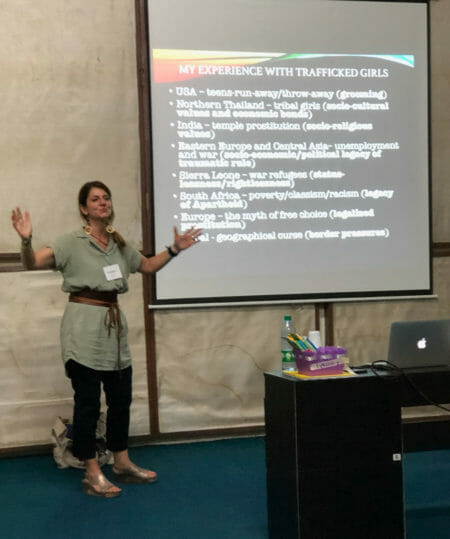 Sure, there’s no declared war on the horizon, but, even so, few would describe our world as “at peace.” Violence of all types ensures the dream remains just that, and no more.
Sure, there’s no declared war on the horizon, but, even so, few would describe our world as “at peace.” Violence of all types ensures the dream remains just that, and no more.
Laura Parajón, a medical missionary in Nicaragua, said in remarks Wednesday that the World Health Organization estimates that 20,000 children die every hour due to the “violence of poverty,” which keeps poorer children from medications that successfully treat simpler issues such as diarrhea or pneumonia.
Then there’s the illegal sex trafficking business—a multimillion dollar illegal industry, second only to weapons and drugs—that enslaves women, for the most part, through psychological manipulation and exploitation fueled by extreme poverty, said Francesca Nuzzolese, a pastoral theologian and professor, who has studied sex trafficking across the world.
The photos of young girls ensnared in trafficking that Nuzzolese shared in her workshop showed spare frames, fine features, haunting smiles. The stories told were more haunting still: 8-year-old girls serving eight to10 clients a day; other girls “sold” to pedophiles for three days at $5,000.
Of her first visit to Thailand, the sex-trafficking capital of the world, Nuzzolese said, “It made me feel ashamed to be human.” Soon she was asking herself, “What do I do now?” Today she sees her journey as seeking ways to help fight trafficking as a “crucial expression of justice and peace-making.”
Violence has, indeed, seeped into our world in the most insidious ways. The oppression of poverty and sex trafficking is more subtle than terrorist attacks and random shootings in malls, churches and nightclubs.
But the close to 400 people—from 30 countries on six continents—here at the Global Baptist Peace Conference in Colombia are determined to confront this violence. These are committed, passionate people—people who are standing up for the most vulnerable among us and not planning to stop anytime soon. Thank heaven for that.
July 17, 2019
What does peace mean to you?
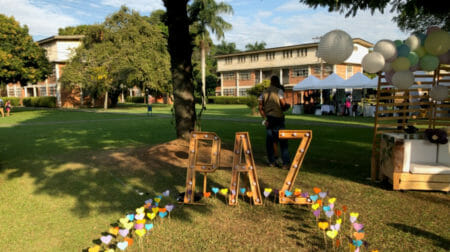 How easy it is to take the word peace for granted. We close e-mail messages or notes to friends with it, perhaps occasionally substituting the Spanish paz for its English counterpart. In worship, we pass the peace; we even use peace from time to time when we part from friends and family.
How easy it is to take the word peace for granted. We close e-mail messages or notes to friends with it, perhaps occasionally substituting the Spanish paz for its English counterpart. In worship, we pass the peace; we even use peace from time to time when we part from friends and family.
Peace is never taken for granted, however, in Colombia.
It’s no wonder. After more than five decades of armed conflict involving guerrilla and paramilitary groups and the Colombian military—further complicated by the production and trafficking of illicit drugs—the pain of murder and mayhem still rips at the fabric of this place. It’s palpable. You can feel the deep, ongoing need for healing.
Panelists and storytellers during Tuesday’s program told tales that tested definitions of basic human decency. Take Maritze Trigos Torres’ powerful testimony about the Trujillo Massacre, for example. Over eight years, from the end of the 1980s into the mid-1990s, 342 victims lost their lives in this southwestern Colombian town at the hands of paramilitary forces and a drug cartel, with complicity of the Colombian military and police.
Eighty-eight of these people simply disappeared. Many were tortured. One priest, who supported a peasant protest and denounced the violence wreaking havoc on the region, was abducted as he returned home from leading a funeral mass for a friend. He was beheaded, castrated and his hands dismembered, Torres said. A photograph showed his mutilated body arranged like a trophy.
This is just one example of atrocities committed on both sides of the conflict—and this kind of violence leaves psychosocial scars that beg for amnesia. In this context, you can’t afford to take peace for granted. In this context, perhaps only the peace that passes all understanding can fill the chasm of longing for healing and wholeness.
Violence has decreased since the signing of the peace accord in 2016, but implementation of the agreement has proven challenging. Even so, a clear commitment to moving forward and the hope that brings fill the air.
Torres put it like this: “Endure. Persist. Never give up.”
July 16, 2019
Practice war no more?
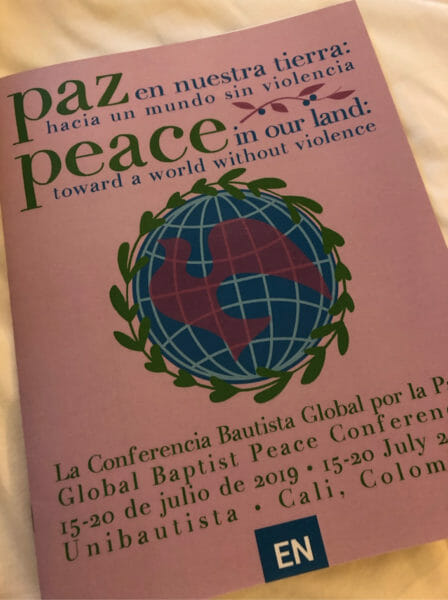 When the plane landed in Miami, where I was connecting to Cali, Colombia, on Saturday, the woman sitting next to me said, in a wry tone, “Are you really going to a peace conference in Columbia?” (Emphasis on really.) She had obviously noted my reading material: The Global Baptist Peace Conference program.
When the plane landed in Miami, where I was connecting to Cali, Colombia, on Saturday, the woman sitting next to me said, in a wry tone, “Are you really going to a peace conference in Columbia?” (Emphasis on really.) She had obviously noted my reading material: The Global Baptist Peace Conference program.
Oh my, does the idea of a conference about peace sound that 1960s?
Of course, it does. But then I suppose that’s what attracted me to this journey in the first place. If the counterculture generation of the 1960s still hasn’t obliterated war—close to a half-century after Kent State and Haight-Ashbury—it seems to me that we need to work a whole lot harder at figuring out this world peace idea.
There is good reason to believe this week’s conference—“Peace in Our Land: Toward a World without Violence”—can help in that regard. The location was chosen because it offers the opportunity to hear from some of the “main actors” involved in negotiating the Colombian Peace Accord from 2012 to 2016.
Considering the challenge that can come simply with negotiating peace within a family, I am eager to learn how peace was brokered in this internal, national armed conflict that had worn on for decades. How do you meet a guerilla group halfway? What lessons learned will nurture negotiations in other conflicts? How do we build a world in which we practice war no more?
The stakes are high for all of us. Stay tuned: These are lessons we can no longer afford not to master.
Susan L. Gottshall is American Baptist Home Mission Societies’ associate executive director of Communications.

